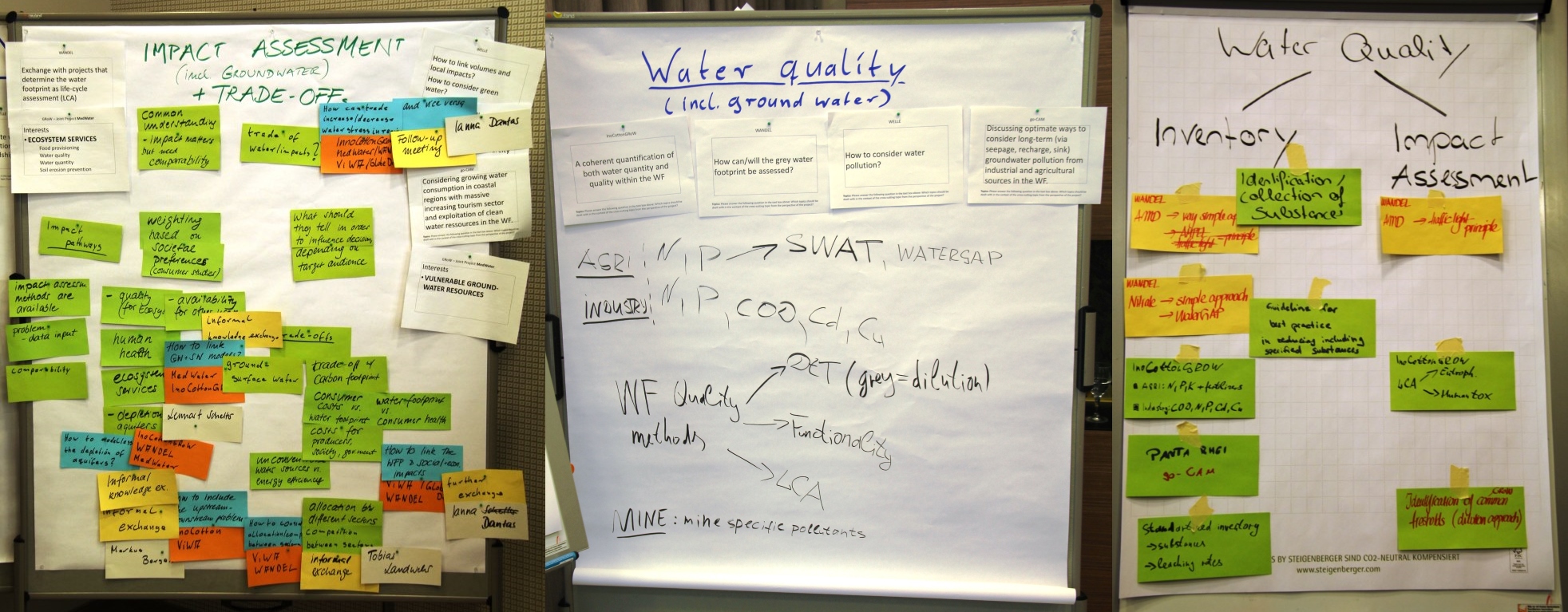Already at the GRoW launch conference in September 2017 in Karlsruhe cross section topics playing a role in a number of projects, respectively, were identified by the twelve projects that are part of the joint project. Three topics were selected to be worked on together in the future: "Water Footprint" (contact person: Dr. Markus Berger), "Economic and other incentive mechanisms" (contact person: Prof. Dr. Karl-Ulrich Rudolph) and "Achievement of the Sustainable Development Goals (SDGs)" (contact person: Prof. Dr. Claudia Pahl-Wostl). From 21st tom 23rd March representatives of all GRoW projects that show points of contact to these topics, met in Berlin to exchange on the latest project progresses and to determine further measures regarding the cross section topics. In the future the representatives will met semi-annual, work on the cross section topics in-between will be organized on demand with the help of adelphi.
Cross section topic Water Footprint
- How can me model the depletion of aquifers?
- How can we connect the water footprint to social and economic impacts?
- How can we combine groundwater and surface water models?
- How can we solve upstream-downstream problems?
- How can we deal with competition and allocation between sectors?

Cross section topic Economic and Other Incentive Mechanisms"
The cross-cutting theme "Economic and Other Incentive Mechanisms" was marked by a policy debate on managed, economic and preventive systems and their impact. Particular attention was given to not predicted influences. For example, the promotion of biogas plants in the Oldenburger Münsterland led to increased fertilization and thus a qualitative deterioration of the groundwater. It is important to be able to recognize these and similar conflicts of interest early on.
From this debate, there were several focal points, of which three ultimately prevailed by majority vote. The topic "Assessing Governance" takes into account the fact that administrative systems, by their very nature, make incentive systems more or less effective. This shall be made assessable. The "potentials of digitization" deal with the possibilities as well as the obstacles that networked tools can offer in terms of economic support systems. The focus on "irrigated agriculture" came from the desire of several GRoW partners working in the field to try to make agricultural use of water more effective through innovative governance concepts.
Cross section topic SDG Achievement
The GRoW Directive is committed to facilitating and advancing the implementation of the UN-proclaimed SDGs in the international environment around the resource of water through in-depth research. However, there are still some aspects that remain unclear, which is why the participants spoke out in favor of defining the common objectives by means of a position paper for all GRoW partnered project participants. This should strengthen the position of GRoW project representatives at international conferences. In particular, the forthcoming focus on SDG 6 in the UN and the "International Decade for Action: Water for Sustainable Development 2018-2028" will be taken into account.
In the course of the discussions, the participants agreed on two topics to be covered. On the one hand, "indicators / data / models" are still not finally defined in relation to the SDGs. For example, there is a lack of consistent SDG standards for water quality and aquatic ecosystem assessments. The GRoW group advocates that this state shall be terminated soon and wants to internally define which values and systematics are suitable. This should be communicated to the outside. The inherent question about "conflicting goals and synergies of governance and structures" of SDGs (water vs energy vs food) should be analyzed internally by GRoW. For example, an inventory and the decoding of interdependencies in the individual projects should be made. At the same time it should be determined if the type of governance-structure analysis between the projects can be harmonized.
Thanks to Tobias Landwehr, USF, for reporting the meetings on the cross-cutting topics "Economic and Other Incentive Mechanisms" and "SDG Achievement".
